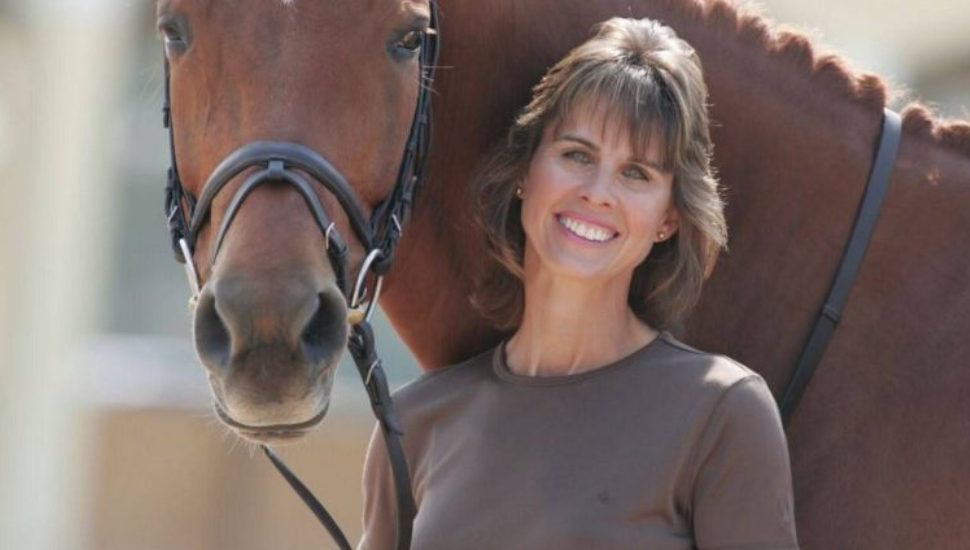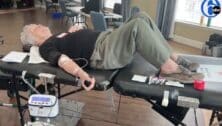Chester County Leadership: Susan Springsteen, President, H2O Connected


Susan Springsteen, the President of Coatesville-based H2O Connected, spoke with VISTA Today about growing up in Delaware; her passion for riding horses; rescuing a pony from meat-buyers after its boarding stable went out of business; and how the experience made her realize that she could do anything she set her mind to.
Springsteen also discussed attending Wheaton College in Illinois, where she dropped out before returning and changing her major; working in money management for decades; becoming an entrepreneur who, with her business partner, developed a product that detects and quantifies costly water loss in toilets; and the challenges and opportunities that lie ahead for her company.
Where were you born and where did you grow up?
I was born the oldest of two children and grew up in Northern Wilmington, Delaware. We lived in a housing development right behind the Concord Mall.
What did your parents do?
My mom was a homemaker. She stopped working when I came along. My dad owned a leasing company and was gone for most of my childhood.
What memories do you have growing up in Wilmington?
I have great memories of our family traditions that surrounded Thanksgiving and Christmas. My mom was a fantastic cook, the house always smelled great. In the winter there was a wood fire burning in the fireplace every night. I would come home from the barn, frozen solid, and warm up by the fireplace with a cup of hot chocolate, while my mom would patiently listen to the escapades of my day!
I also remember trying to ride every horse I could get my hands on.
When did that bug bite?
I think before I could talk! Before I could even read, I’d get volume H of the Encyclopedia Britannica out of the bookshelf and look at the pictures of the different breeds of horses. My favorite was the Lipizzaner pictured in a “high school” dressage movement called the Levade, so I guess I was destined to be a dressage rider! No one in my family rode, so I would beg my parents for pony rides, and I loved getting out of the car to pet horses grazing near the side of the roads.
Did your parents accommodate you or try and put you off?
Originally, they thought I would grow out of it. Then when I was 9, they gave in to the incessant begging.
We didn’t have a lot of money growing up, and even back then horses were expensive, so I am still grateful that they made the sacrifice so I could have my weekly lesson.
When I was in junior high school, to pay for extra riding lessons, I convinced my mom that I was so hungry, I needed to eat two school lunches, which were 45 cents apiece. I figured out I could survive on a peanut butter and jelly sandwich and water, which was 20 cents, and I saved the rest for riding lessons! My instructor would roll her eyes when I paid her with quarters!
Other than a love for riding horses, what else about your childhood stands out?
So many life lessons! When I was in 4th grade, the girls would play a game during recess called “Hi-Lo Waters”. A girl would hold each end of a jump rope and we would all line up and jump over it. The jump rope would be raised after each round. Anyone who didn’t clear it was out and the winner was the one who could jump the highest level.
I was an above average jumper, but certainly not the best – Vicki Jenkins could jump a building! Even so, each day at the beginning of recess the girls would ask me to set up the game – who should hold the ropes, what the lineup should be, etc. At first, I didn’t understand why they were asking me – after all I wasn’t the best. Shouldn’t the best jumper lead the game? Then it dawned on me that I didn’t have to be the best performer to be the leader. Those roles required different skill sets. That was a real “AHA Moment” for me.
Another lesson centered around my first Girl Scout Cookie Sales contest. Back then, we sold cookies door-to-door. I wanted to win this contest in the worst way by selling the most cookies. For weeks I walked far and wide by myself, knocking on doors and selling scores of boxes of Girl Scout cookies. I was feeling pretty good about my chances …. but I came in second to Janine Finch. I found out later that her father was an executive with DuPont and had taken her cookie sign-up sheet to work and distributed it throughout the company. She never had to knock on a door. That was my first lesson (of many) in the brutal reality of “Life is not fair”.
When I was twelve, I was riding a pony named Snowflake. He belonged to a boarding stable in northern Wilmington that was going out of business. The horses were scheduled to be sold at the New Holland Auction. We all knew that the New Hollard Auction was where meat buyers would purchase the ponies by the pound. I was afraid that Snowflake would see France from the inside of a can.
At the last minute, the stable owner told my dad we could have Snowflake for $50. My dad agreed if I could find a place to keep the pony for $30 a month. All the horses were already loaded up on the truck for transport to the auction, so I grabbed the pony off the truck, locked myself and the pony in the stable office with a phone and a phone book (it was 1972 – no cell phones). I started making calls to any place that sounded like a farm. I finally found a farmer who agreed to keep the pony in a paddock with a run-in shed for $30 a month. Snowflake was mine.
Susan, where does that determination come from?
I think the fear of missing out on what’s important to us must be greater than our fear of what it takes to get it. And I really wanted to save that pony!
My mom raised us with the idea that we could do anything we put our mind to, and I believed her. When we step outside of our comfort zone and are successful, we develop the confidence to step outside our comfort zone again at a larger level, which is how we grow.
Did you have any jobs growing up?
Like many young girls, I started working as a babysitter.
I also led pony rides and drove a pony cart at local fairs. The owner of the “pony business” would load 4 ponies and 4 kids into the bed a pickup truck and drive us to the fairs. I loved it but it’s a wonder we lived!
When I got Snowflake, we didn’t have the money for me to have a bridle and saddle, so I rode him bareback and put a clothesline in his mouth. I rode him everywhere like that. I realized that was a short-term solution so, at 13 years old, I started a house cleaning business to get enough money to buy a saddle and bridle. After cleaning for 8 months, I had the $269 to get my dream saddle, and eventually the other necessary accessories.
Earlier, when I was 10 or 11, I decided to make money by having a carnival in our backyard. My mom helped me organize the logistics and was the “seed capital investor” for the startup costs of tickets, prizes, etc. I invited everyone in the neighborhood. My friends helped me run the game booths. The man with the Pony Business loaned me a pony for the day for my backyard carnival. It became quite the annual event in our neighborhood. We even made money, which we donated to charity.
And you worked at McDonalds too, yes?
I did. That was my first real job. I learned a lot there and developed great friendships with my coworkers. We took a lot of pride in our store.
What lessons did you take away from those jobs that still stay with you today?
The importance of showing up, being dependable, discovering a customer’s needs, and how to meet them. Lots of lessons in delayed gratification – doing what I might not want to do to achieve a desired result in the future.
Also, there is always the opportunity to get ahead if we take the initiative. For instance, at McDonalds, we got a 30-minute break on our shifts to eat. While on break, out of curiosity, I started reading the store manager’s manual.
Within a few months I knew the various details involved with running the front of the store. I would ask the managers to quiz me during my shift and it became a bit of a game. However, before long, they started asking me to manage the front of the store (at age 17) when the need arose. It was a great experience and taught me the benefits of educating myself about my job on my own time.
When I worked at McDonald’s, the minimum wage was $3.05 an hour. However, the store would bonus us $1.00 for the hour if we sold over $100 worth of food at the counter. This was hard to achieve since burgers were 30 cents each!
I was on a mission! I developed my own little system for very quick order fulfillment …. Which included adding the orders up in my head on my way back from the French fry station, so I only had to put the total amount in the manual cash register. My average time to fulfill an order for a cheeseburger, fries, and medium coke was 34 seconds! In the end, I held the record for most food sold in an hour in that store for years.
What I learned was the intangible thrill of finding my niche and being really good at it, as well as the confidence that accomplishment inspired to pursue achievements in other unrelated parts of my life.
Were you always competitive?
I never thought of myself as competitive at the time. I just wanted to excel at what I was doing.
In my early years of competing with horses, I never won anything. I usually had to beg my way on to other people’s horses, and they were often not fancy, so when I would show, I never expected to win. In a lot of ways, I was just happy to be on a horse. To this day, I am still stunned when I win something!
What kind of music were you listening to back then?
Most of my free time was spent at the barn so whatever was on the barn radio at the time. I enjoy and appreciate a broad range of music genres.
Were you a good student?
Yes and no. My high school was very drug-infested, and the teachers graded on a curve. I never got into the drug or alcohol scene because I knew my riding coach would not stand for that. So, I got good grades without ever really having to try too hard because I wasn’t stoned!
Where did you go to college?
I went to Wheaton College in Illinois. My parents were afraid I was going to marry the manager at McDonalds, so they pressured me to attend college outside of the area. My parents told me I’d be paying for college myself if I went anywhere but Wheaton, so Wheaton it was!
Was Wheaton a good fit for you?
It was a small Christian liberal arts college with all 50 states and 30+ countries represented in 2500 students. It was great exposure to so many cultures and backgrounds, yet we all shared the same faith, so there was an underlying connection among the students.
I didn’t know what I wanted to do with my life and felt a little panicked about that because it seemed like everyone else had their life planned out. I think this kept me from relaxing into the typical college experience. I knew what I didn’t want to do: teacher, doctor, lawyer, nurse, etc. but not what I wanted to do. I became a biochemistry major for no good reason and felt like it really wasn’t a fit. In my junior year, I had to take fruit flies home over Christmas break and count their eye types daily for a genetics class.
That was the tipping point. I quit and dropped out of college. I spent the rest of the school year working at restaurants full-time. It was good money, but I decided it was not an ideal career path for me. I returned to school and changed my major to business/economics and, miracle of miracles, still ended up graduating on time!
Why business and economics?
I had gained a little bit of weight (actually, a lot!) before I dropped out of school and so had my dad, so we went out for long walks together for exercise. We talked about his business and the deals he structured. I was fascinated.
Also, in high school, there was a math teacher everyone respected, Denise Griffiths, who taught calculus. Everyone said it was the hardest class in high school so naturally, I wanted to take it. I studied harder in that class than any other class in high school and learned enough to test out of a semester of calculus in college. However, the most important thing she taught me was that it was cool for a woman to be good at math. At that time, anything math-related was very much a male-dominated field, but my experience in her class nudged me to pursue a career in the investment industry.
Looking back over the last twenty-five years, who were the people who saw something in you that helped you get ahead?
The number of people who have helped me over the years could fill an urban phone directory!
I would say, early on, my first boss after college, Bobby Greenberg. He was the former Treasurer of Philadelphia under Frank Rizzo. He created a specialty corporate finance group at the Philadelphia investment bank and brokerage firm, Butcher & Singer. I became one of his analysts. At that point, there were not many non-administrative women in the investment world. He taught me a lot about structuring deals and introduced me to the movers and shakers in the Philadelphia business community. When his department was changing, he gave me the encouragement to become a stockbroker.
Jamie Lowry was a bank-turnaround specialist in the 1980s. In the early ‘90s, he bought two brokerage firms and hired me. He gave me the opportunity to put together a fee-based money manager search and monitoring service and develop my own department, which was a great opportunity. Through him, I met Mario Gabelli, who had a significant stake in our company. He is a legendary money manager. I was able to learn a lot from him about how he evaluated companies, made trading decisions and saw opportunity.
Fred Sherman, an investment broker who provided the business reports for KYWNewsRadio 1060 for decades introduced me to KYW. I wanted to do the business reports too, so I took him out for breakfast and asked for his help. He told me where to send a letter, but I suspect he paved the way for me to audition. For almost 10 years I provided 4 early morning and drive-time business reports each day for KYW, which was a huge opportunity. I am still extremely grateful for his help in making that happen.
You’re thirty at the time, and these guys are trusting you with an awful lot, what did they see in you?
That’s a great question! I don’t know!
What led you to start nth Solutions?
I was in the money managing industry for decades and I had a lot of small business clients. I was comfortable advising them on their pension funds and their personal assets. However, there were a lot of issues they were grappling with that I just couldn’t understand on a gut level since I did not own a small business myself. I thought, if I’m really going to understand how they think, I need to walk in their shoes.
So, I looked to invest in a small, start-up business that I could build outside of my investment management practice. In 2005, through church, I met Eric Canfield, who is my business partner, and we started talking about his idea for water conservation and damage prevention products that he wanted to bring to market. I thought water would someday be a BIG idea, so I was intrigued. Eventually, we bought the contents of his office from the manufacturing company he was working for and started nth Solutions.
Where did the idea for the LeakAlertor® come from? Was it developed in your lab?
We originally set out to develop a product that could prevent toilet overflows. Eric’s four daughters were constantly overflowing the toilet. He couldn’t find a solution to the problem, so he invented one. We developed the technology to prototype level and filed the patents on it. However, the cost of tooling for manufacturing at scale was going to exceed the funds we had available. So, we decided to focus first on developing a leak detection device for toilets (most of the 350 million North American tank toilets will leak as well as overflow at some point). The LeakAlertor® was born. It is now in its 6th generation, sold on Amazon and through our LeakAlertor.com website as the LeakAlertor 6000.
This year, we introduced the wireless LeakAlertor PRO system for multitenant and hospitality property managers. This system will detect and quantify nearly every type of water loss problem that can occur in a tank toilet, and it sends a text message to maintenance personnel when there is a problem that needs to be solved immediately. There is a dashboard that provides water usage and loss analytics for each toilet on the property and the whole system installs in seconds per toilet. It’s designed to help maintenance personnel be very efficient. We are getting rave reviews about the system, and it often pays for itself within 6 months or less through the water savings.
Yes – our team developed it ourselves, right here in Chester County! Everything is done internally – market research, concept design, product development, IP protection, optimization for manufacturing, manufacturing, and distribution.
Looking ahead into 2022, what are the challenges and opportunities ahead of you?
In 2021, we launched the LeakAlertor PRO locally, with our engineers and marketing folks performing the installations, so that we learned what needed to be adjusted as the system performed in different environments. Now we are ready to scale production and sales, so that is the focus for 2022. By extension, we expect the LeakAlertor 6000 sales (the homeowner version) will also increase.
We also will be building out our team with additional sales, engineering, and manufacturing employees. The challenges are similar to what other companies are facing – potential supply chain disruptions and identifying the right personnel fit, as well as managing growth so it doesn’t overwhelm our team.
In 2019, we established H2O Connected LLC as a water tech company, which contains the LeakAlertor products and related technologies developed by nth Solutions.
We knew we would be raising capital to develop the LeakAlertor PRO System and scale it to market dominance, so we decided to incubate it as a qualified opportunity zone business to give our investors an extra potential benefit. Since we love Chester County, and Coatesville is the qualified opportunity zone for Chester County, I investigated the City as a possible location. I met with City leadership, members of the community, the business owners, basically anyone who would talk with me, and decided it was the most underrated 1.9 square miles in America, so we incubated H20 Connected in Coatesville.
An associate of mine, Proudfoot Capital, purchased the vacant, former Lukens Steel Office Building at 190 West Lincoln Highway. Over the past year and a half, we have renovated the historic building and added a 20,000 square foot expansion building to create the nth Innovation Center. In June we moved H20 Connected, nth Solution, and our other incubated companies there. LeakAlertors are now manufactured in Coatesville! It’s exciting to be able to grow this phenomenal product line in the City at a time when Coatesville is undergoing such an exciting transformation.
We are also focused on growing our long-term high school internship program. Between H2O Connected and nth Solutions, we have over a dozen high school interns who work alongside the professionals to develop products and launch them into the marketplace. Many of them are even named inventors on our issued patents because of their contribution to the inventive process. We have a STEM track and a marketing track. It lasts over two years, so we really get to watch our interns grow over the time they’re with us. We work with a variety of high schools, including Coatesville now and we are looking forward to expanding our relationship with the Coatesville Area School District.
What do you do in your free time?
I still try to ride every day. I am an avid dressage rider. Until 2018, I had a training center in Chester Springs where I taught twenty lessons a week and had 14 horses under my care! (I had GREAT help!) I have scaled back my teaching and training practice a lot, but I still have a few students and get to train Grand Star, a wonderful mare I hope to start competing again in the spring of 2022.
I also try to get my Pilates workout at least three times a week. According to Joseph Pilates, “You are a young as your spine”. So, I want to keep mine in good shape!
Finally, Susan, what is the best piece of advice you’ve ever received?
I love inspiring quotes. Some of my favorites are:
Wayne Gretzky’s “You miss 100% of the shots you never take.” This helps me to consider, not only the consequences of doing something, but also the consequences of not doing it.
Mark Twain said,” The two most important days in your life are the day you were born and the day you found out why.” I have no doubt that I am living my “why”. In building H2O Connected, the positive impact I can have on our employees, interns, the City of Coatesville, the planet, as well as the stewardship responsibility to our investors, is not just a career — it’s a calling. To be called to make that kind of difference is a blessing beyond measure.
“Good judgment comes from experience and experience comes from bad judgment”. I don’t know who said it – but it reminds me to learn from my mistakes, yet not to let them paralyze me from seizing future opportunities.
And finally, a paraphrase from the Bible, “you reap what you sow; more than you sow; later than you sow.” It’s also a direct quote from Charles Stanley, one of his “31 Principles for Living.” I think about this a lot when evaluating the future ramifications of my decisions, also known as the Law of Unintended Consequences. Rather than focus on how does this impact me (and others I care about) today or tomorrow, I focus on will this decision lead me to something I (and others) want to reap later?
Connect With Your Community
Subscribe to stay informed!
"*" indicates required fields










































![95000-1023_ACJ_BannerAd[1]](https://vista.today/wp-content/uploads/2023/03/95000-1023_ACJ_BannerAd1.jpg)








